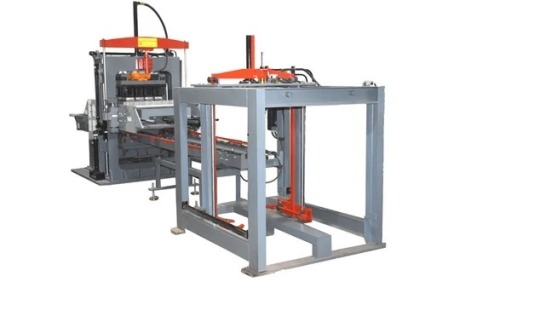Text
A Comprehensive Guide to Hydraulic Paver Block Making Machine
Welcome to "A Comprehensive Guide to Hydraulic Paver Block Making Machine." In the ever-evolving world of construction and infrastructure development, the significance of efficient and eco-friendly building materials cannot be overstated. Paver blocks have emerged as a popular choice due to their durability, versatility, and aesthetic appeal. At the heart of this revolution lies the Hydraulic Paver Block Making Machine – a game-changing technology that has transformed the production of paver blocks.
This article aims to delve into the intricacies of Hydraulic Paver Block Making Machine, providing a detailed exploration of their working principles, key components, and various types available in the market. We will uncover tips and some troubleshooting steps.
Moreover,we will highlight essential considerations for selecting the right machine that aligns with specific project requirements. Whether you are an industry professional seeking to optimize production processes or an enthusiast eager to grasp the mechanics behind paver block manufacturing, this guide will equip you with invaluable insights.

Understanding Hydraulic Paver Block Machine Specifications
When it comes to hydraulic paver block machines, understanding their specifications is crucial for making informed decisions. These machines are essential for producing high-quality, durable, and aesthetically pleasing paver blocks used in various construction projects.
Hydraulic paver block machine specifications encompass a range of key features. The capacity, which determines the number of blocks produced per hour, directly impacts productivity. The molding area size affects the dimensions and shapes of the blocks. Additionally, the power and pressure rating influence the machine's efficiency and performance.
Moreover, it's essential to consider the automation level and control system, as advanced automation ensures precision and ease of operation. The type of molds compatible with the machine allows for versatility in block design. Understanding these specifications empowers buyers to select the ideal hydraulic paver block machine that aligns with their specific project requirements, resulting in cost-effective and successful paving solutions.
Choosing the Right Paver Type: Interlocking vs. Non-interlocking
When it comes to selecting the right paver type for your project, the choice between interlocking and non-interlocking pavers plays a crucial role in determining the overall outcome. Here are some key points to consider for each option:
Interlocking Pavers:
Interlocking pavers are designed to fit tightly together, creating a durable and stable surface.
They offer excellent load-bearing capabilities, making them ideal for driveways, walkways, and high-traffic areas.
The interlocking design provides flexibility, allowing them to withstand ground movement without cracking.
These pavers come in various shapes, colors, and patterns, enabling versatile and visually appealing designs.
Installation is relatively easier due to the interlocking system, reducing labor time and costs.
Repairs are simple, as individual pavers can be replaced without affecting the entire surface.
Non-Interlocking Pavers:
Non-interlocking pavers are more affordable compared to their interlocking counterparts.
They are suitable for light to moderate traffic areas like patios, garden pathways, and decorative landscape elements.
Installation may require more precision and skill as they do not have the interlocking mechanism.
Although repairs are possible, they might be more labor-intensive and could involve replacing larger sections.
Pro Tips for Maintaining Your Paver Block Making Machine
Regular Cleaning: Clean the machine daily to remove any residual concrete and debris that can cause blockages or malfunctions.
Lubrication: Keep all moving parts well-lubricated to reduce friction and prevent wear and tear.
Inspection: Conduct routine inspections to identify and address any signs of wear, damage, or misalignment promptly.
Tighten Bolts: Check and tighten all bolts and nuts regularly to maintain stability and prevent vibrations.
Replace Worn Parts: Replace worn-out parts immediately to prevent further damage and ensure optimal performance.
Calibration: Calibrate the machine regularly to ensure accurate and consistent block dimensions.
Electrical Connections: Inspect and secure electrical connections to prevent electrical issues.
Professional Maintenance: Schedule periodic maintenance by qualified technicians to address complex servicing and extend the machine's lifespan.
Operating Guidelines: Train operators on proper machine operation and safety protocols to prevent mishandling or accidents.
Store in Shelter: Store the machine in a sheltered area to protect it from weather conditions and extend its longevity.
Troubleshooting Hydraulic Paver Block Making Machine
Low Block Quality: Adjust the hydraulic pressure and ensure proper alignment of molds to improve block quality.
Block Disintegration: Check the mix proportions of raw materials and the curing process for better block strength.
Oil Leaks: Inspect hydraulic hoses and connections, repair or replace damaged parts, and refill hydraulic oil as needed.
Excessive Noise/Vibrations: Tighten loose components and bolts, and ensure proper leveling of the machine.
Uneven Block Height: Verify uniform material distribution in the mold and calibrate the machine for consistent block height.
Machine Not Starting: Check power supply, fuses, and safety switches; repair or replace faulty electrical components.
Insufficient Block Production: Clean and maintain the machine regularly, and optimize the production process for efficiency.
Irregular Block Shapes: Inspect mold condition, ensure proper vibration, and adjust mold settings to achieve uniform shapes.
Safety Hazards: Implement strict safety protocols, provide training to operators, and display safety guidelines prominently.
Seek Professional Help: If issues persist, consult experienced technicians or manufacturers for advanced troubleshooting and repairs.
Conclusion
A Comprehensive Guide to Hydraulic Paver Block Making Machine highlights the indispensable role of perfect hydraulic machines in revolutionizing paver block production. The detailed exploration of working principles, types, and maintenance underscores their efficiency and eco-friendly advantages. By embracing these cutting-edge technologies, the construction industry gains a competitive edge in creating durable and visually appealing infrastructure. As Perfect Hydraulic Machines continue to shape the future of paver block manufacturing, their impact on sustainable construction practices remains unparalleled.
#Hydraulic Paver Block Making Machine#perfect hydraulic machines#hydraulic machines#Fly Ash Brick Machine
2 notes
·
View notes